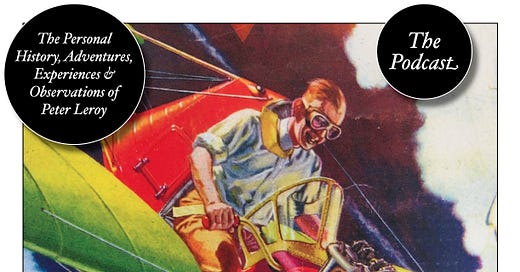THOUGH THE ROOM IS CROWDED with people who are all gesticulating animatedly, he doesn’t spill a drop in carrying the drinks to the outskirts of the crowd, where Belinda’s standing in front of an arrangement of enormous obscene flowers, bizarre-looking things with penile elements and great leaves shaped like escutcheons of pubic hair.
“Are these real plants?” Matthew asks.
He has been amazed by the biological emulation he sees in the creatures that star in fantastic movies, so he wouldn’t be surprised if that kind of high-tech weirdness had reached the fake-plant business. He touches a leaf with his little finger, gingerly. He can’t decide whether the thing feels real or not. It has a waxy quality that doesn’t seem botanical, but it moves like part of a real plant, shudders when he brushes it, and the penile member bobs gently over his forehead.
“Do you know what these are called? Do you think they’re a product of genetic mutation? Maybe they’re bred exclusively for the restaurant trade. Maybe they’re given drugs to make them grow outlandishly. What do you think?” He’s making witty chatter.
Belinda isn’t listening. “Hmmm?” she says. “Oh. Sorry, Matthew. I wasn’t listening.” She leans closer to him and lowers her voice. “I was watching two guys behind you. Take a look. Go ahead — they’re not looking this way.”
He turns and looks.
“Are they too handsome or what?” Belinda asks.
Matthew sees two young men at a table of the kind that would have been used in a diner when he was a boy — chrome legs, a plastic top — but the plastic has a zebra-stripe pattern. They look like male models, the rugged, well-muscled type of male model. Matthew turns back toward Belinda, feeling that old feeling of adequacy coming on. Formerly, he called this feeling mediocrity, but he decided he was being too hard on himself. Adequacy is bad enough. He suffers from the least noticed but most widespread of modern emotional afflictions of men his age — an adequacy complex. Among its symptoms is the lack of prominent symptoms. Consider Matthew as a fairly typical case: not unattractive, not unintelligent, not unsuccessful, not unhealthy, not even, at a random moment — this one, for example — terribly unhappy. He thinks of himself as adequate, but only adequate, stuck at the adequacy level, and sometimes the bitter taste of his adequacy rises in his throat like heartburn. He’s the sort of person a witness to a crime would have a hard time describing. “Well, he was about average height, average weight, kind of normal-looking, no distinguishing marks, wearing sort of run-of-the-mill clothes. Come to think of it, though, he had kind of unusual socks, but that’s all I remember.”
When he wants to punish himself, he points out to himself that not even in his reviews does he reach or even reach for the top-notch. BW isn’t a critic, after all, just a reviewer, a reviewer of restaurants. Restaurants. His reviews appear in Boston Biweekly, “Home of the Free-Ranging Critics,” a large-format publication on slick paper that reviews everything from books to restaurants, with most of the space going to music and movies, and prides itself on giving critics “their head,” as long as they have “a distinctive voice” and their work is “interesting to read.” Matthew’s editor has said, in a memo to Matthew and his colleagues, “I don’t care what you say about what you review, so long as people will want to read it.” Matthew once complained to Belinda that the magazine didn’t have a serious attitude toward food. He stopped and asked, “What am I saying? A serious attitude toward food! Can a thinking, feeling person have a serious attitude toward food? Other than, say, working for famine relief? A serious attitude toward food? They don’t even care about the food. They don’t want brilliant descriptions of the flavors and textures, the presentation, that sort of thing. What I’m supposed to do is ‘capture the experience’ of being in the restaurants I review. The food is only supposed to be part of it — and not even the most important part. God! How do I live with myself, Belinda? How do I live with BW?”
Belinda said, “I don’t know,” in an attempt to turn the whole thing into a joke, but the truth was that she didn’t think it was a question worth making that much fuss over, though she understood the source of Matthew’s uneasiness.
There is more to Matthew’s uneasiness about the magazine than that, though, something else that bothers him. No one connected with Boston Biweekly has ever uttered a word about it, but all the writers know that there is supposed to be an attitude behind their reviews, an attitude of superiority. The ideal reaction of a reader of one of the Boston Biweekly reviews would be, “My God, what a lousy book [play, movie, concert, restaurant]! But what a perceptive, witty, scintillating, provocative review!” This attitude is, of course, a defense against the mediocrity complex — adequacy complex — that is endemic at the magazine. Matthew is ashamed of the fact that he has made an effort to teach himself to take this attitude. He hasn’t been entirely successful, but he’s working on it. For example, take the two handsome guys Belinda is still staring at over Matthew’s shoulder. Matthew’s supposed to feel superior to them, though he finds it easy to imagine that one is a genius sculptor, the other runs an international famine-relief organization, and they’ve met here in the bar at the Alley View Grill to discuss a benefit to relieve famine somewhere in Africa or India or Asia, while Matthew is here to collect information for a review that will damn the place and its patrons with backhanded praise and acerbic wit, demonstrating thereby that B. W. Beath, Boston Biweekly, and all its free-ranging critics are superior not only to the ground-veal-and-pancetta hamburger, but to the people who come here to eat it, including, of course, the two guys behind Matthew, who are not only a genius and a saint, but gorgeous.
In Topical Guide 417, Mark Dorset considers Sexual Imagery: Plants Perceived as from this episode.
Have you missed an episode or two or several?
You can begin reading at the beginning or you can catch up by visiting the archive or consulting the index to the Topical Guide.
You can listen to the episodes on the Personal History podcast. Begin at the beginning or scroll through the episodes to find what you’ve missed.
You can ensure that you never miss a future issue by getting a free subscription. (You can help support the work by choosing a paid subscription instead.)
At Apple Books you can download free eBooks of Little Follies and Herb ’n’ Lorna.
You’ll find overviews of the entire work in An Introduction to The Personal History, Adventures, Experiences & Observations of Peter Leroy (a pdf document) and at Encyclopedia.com.














Share this post